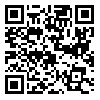Volume 3, Issue 3 (11-2020)
2020, 3(3): 0-0 |
Back to browse issues page
Ethics code: ir.medilam.rec.1397.183
Download citation:
BibTeX | RIS | EndNote | Medlars | ProCite | Reference Manager | RefWorks
Send citation to:



BibTeX | RIS | EndNote | Medlars | ProCite | Reference Manager | RefWorks
Send citation to:
Rezaeefard Z, Azadi A, Mozafari M, Khorshidi A. The association between nurses' moral distress and sleep quality and their influencing factor in hospitals. Journal title 2020; 3 (3)
URL: http://newresearch.medilam.ac.ir/article-1-1263-en.html
URL: http://newresearch.medilam.ac.ir/article-1-1263-en.html
Abstract: (3661 Views)
OBJECTIVES: Nurses in their workplace, for a variety of reasons, always face moral distress that is an underlying issue in the nursing profession, which can lead to problems such as reduced quality and quantity of care and sleep disorder. Besides, given the increased privatization of hospitals, this study aimed to explore the association between nurses’ moral distress and sleep quality and its comparison among nurses in private and public hospitals.
METHODS: This was a descriptive-analytical study involving 150 nurses working in Ilam province hospitals. Sampling conducted using a multistage random sampling method. Data were collected through the questionnaire of socio-demographic characteristics, the Corleychr('39')s Moral Distress Scale (MDS) and the Pittsburgh Sleep Quality Index (PSQI). Data were analyzed using SPSS software version 22. Descriptive statistics like frequency, mean, ANOVA, independent t-test, multiple linear regression and Pearson correlation coefficient at the significant level of P <0.05 were calculated.
RESULTS: The analysis revealed that moral distress was positively associated with sleep quality. Also, the scores of nurseschr('39') moral distress and sleep quality were different in private and public hospitals, so that the level of moral distress in the public hospital and sleep quality in the private hospital was higher and lower respectively, but the difference was not statistically significant. According to the multiple linear regression model, sleep quality, and the type of employment were determined as the most important predictor variables of moral stress (B=1.86) and sleep quality(B=2.39), respectively.
CONCLUSION: As a whole, the results indicated that increased moral distress results in reduced sleep quality in participants. Thus, providing appropriate strategies to prevent moral stress and its complications in nurses is essential
METHODS: This was a descriptive-analytical study involving 150 nurses working in Ilam province hospitals. Sampling conducted using a multistage random sampling method. Data were collected through the questionnaire of socio-demographic characteristics, the Corleychr('39')s Moral Distress Scale (MDS) and the Pittsburgh Sleep Quality Index (PSQI). Data were analyzed using SPSS software version 22. Descriptive statistics like frequency, mean, ANOVA, independent t-test, multiple linear regression and Pearson correlation coefficient at the significant level of P <0.05 were calculated.
RESULTS: The analysis revealed that moral distress was positively associated with sleep quality. Also, the scores of nurseschr('39') moral distress and sleep quality were different in private and public hospitals, so that the level of moral distress in the public hospital and sleep quality in the private hospital was higher and lower respectively, but the difference was not statistically significant. According to the multiple linear regression model, sleep quality, and the type of employment were determined as the most important predictor variables of moral stress (B=1.86) and sleep quality(B=2.39), respectively.
CONCLUSION: As a whole, the results indicated that increased moral distress results in reduced sleep quality in participants. Thus, providing appropriate strategies to prevent moral stress and its complications in nurses is essential
: Cross sectional |
Received: 2018/11/21 | Accepted: 2019/02/27 | Published: 2020/10/14
Received: 2018/11/21 | Accepted: 2019/02/27 | Published: 2020/10/14
Send email to the proposal executer
| Rights and permissions | |
 | This work is licensed under a Creative Commons Attribution-NonCommercial 4.0 International License. |



